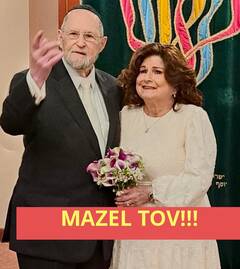The Wedding
12/06/2023 11:26:30 AM
Rabbi Eisenman
| Author | |
| Date Added | |
| Automatically create summary | |
| Summary |

The Chasunah took place on a rainy Sunday in December.
The bride was seated on a Kallah chair, and wellwishers gathered around her to say Mazel
Tov.
The Chosson sat at the head seat in the Chosson's Tisch, surrounded by relatives and friends.
Chosson and Kallah proceeded to the aisle.
The enchanting melody of "Baruch HaBa" and "Berucha HaBa-ah" filled the Shul.
Chayaita, our Kallah, was radiant as her smile illuminated the room.
The Chosson, Gedalia was equally beaming.
He was euphoric and majestic as he strode from under the Chuppah to meet his Kallah a few steps before the Chuppah and escorted her under the canopy.
They made a beautiful couple.
Each of them had gone through their own challenges and vicissitudes to reach this wonderful occasion.
Both had been married before.
In fact, I had been Mesader Kiddushin for Chayaita's previous marriage and had known her for over twenty-five years.
Gedalia, whom I had just met a few months before the Chasunah yet had already forged a close friendship, had also lost his spouse of many decades.
As the couple stood under the Chupah and I made the Brochus sanctifying the Kiddushin, there were more than a few tears in the room.
This was no regular second marriage. (Are there any "regular" marriages?)
This Shidduch came about in the most unlikely of ways.
It began at a Shabbos retreat organized by Ohel and their bereavement division.
Yet, this retreat was in itself very unique.
It was a Shabbos of Chizuk specifically for parents who had lost adult children.
This amazing support group is one of Ohel's most unique, perhaps unknown, support groups.
Under Dr. David Mandel's direction, Ohel has established this support group as part of their Trauma Outreach services run by Dr. Norman Blumenthal.
Many couples and individuals who have lost adult children have found Chizuk through this amazing support group.
A few months ago, Gedalia and Chayaita were both attendees at a Shabbos retreat as both of them had lost adult children.
As Friday night davening ended, and Gedalia slowly made his way to the dining area, he sang "Yigdal."
Yigdal, which emphasizes our belief in the fundamental tenets of Yiddishkeit, is a favorite niggun of Gedalia.
He sang it to his wife when she was sick, and he sang it to himself every Friday night, giving him much-needed Chizuk and hope.
On this particular Friday night, Chayaita, who happened to be walking just a few feet behind Gedalia, heard him singing.
"That niggun reminds me of my father. He, too, used to sing Yigdal to that beautiful tune."
Gedalia and Chayaita began talking.
And over Shabbos, they continued to talk and share.
As the Shabbos ended, both of them realized that although they were attending a retreat that dealt with the loss of a loved one, namely, an adult child, they had -as only Hashem could orchestrate- found a new loved one.
Over the course of the next few months, their courtship grew.
Daily phone calls became hours-long conversations. Soon, Shabbos would not be Shabbos without Gedalia singing to Chayaita "Yigdal."
The Shabbos designated to cope with loss had become a Shabbos of discovery, where each one of them found their Bashert.
Soon, the date was set.
A few days before Chanukah, on the twentieth of Kislev, Chayaita and Gedalia became husband and wife.
Who else but Hashem could have orchestrated and planned that two people grappling with losing a loved one would actually find their soul mates on a Shabbos dealing with loss?
Yet, even more, who else but Hashem could have brought together a ninety-year-old man with a seventy-seven-year-old woman and had them celebrate with the same love and excitement of a couple a decade younger?
Shidduchim are indeed made in heaven.
Sun, October 26 2025
4 Cheshvan 5786
Today's Calendar
| Daf Yomi - Rabbi Jacobowitz : 9:00pm |
Friday Night
| Candle Lighting : 5:35pm |
Shabbos Day
| Hilchos Shabbos - Rabbi Eisenman : 8:15am |
| Bein Adam L'Chaveiro - Rabbi Eisenman : 11:15am |
| Daf Yomi - Rabbi Jacobowitz : 2:40pm |
| Massechta Taanis - Rabbi Eisenman : 4:20pm |
| Sixth Perek of Brachos - Rabbi Wiederblank : 4:20pm |
| Mesillas Yesharim w. Shalosh Seudos - Rabbi Eisenman : 6:03pm |
This week's Torah portion is Parshas Lech Lecha
| Shabbos, Nov 1 |
Candle Lighting
| Friday, Oct 31, 5:35pm |
Shabbos Mevarchim
| Shabbos, Nov 15 |
Important Links
Zmanim
| Alos Hashachar | 5:58am |
| Earliest Tallis | 6:25am |
| Netz (Sunrise) | 7:20am |
| Latest Shema | 10:00am |
| Zman Tefillah | 10:53am |
| Chatzos (Midday) | 12:40pm |
| Mincha Gedola | 1:07pm |
| Mincha Ketana | 3:47pm |
| Plag HaMincha | 4:54pm |
| Shkiah (Sunset) | 6:01pm |
| Tzais Hakochavim | 6:42pm |
| More >> | |
Privacy Settings | Privacy Policy | Member Terms
©2025 All rights reserved. Find out more about ShulCloud


